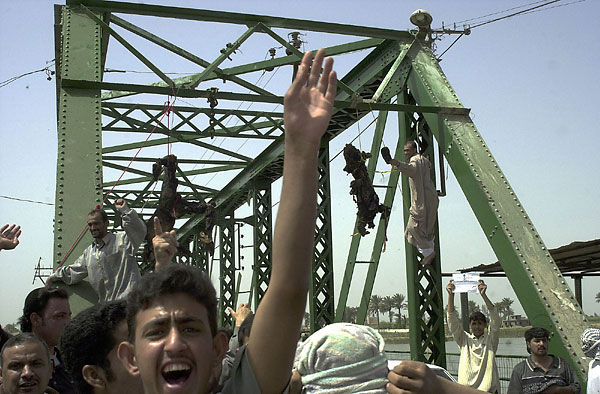For Americans, the city that was home to 320,000 people before ISIS still evokes chills.
對美國人來說,這個ISIS到來之前有著32萬人口的城市如今仍會讓人感到陣陣寒意。
In 2004, four Americans working for the defense contractor Blackwater were ambushed and killed,
2004年,四名為國防承包商“黑水”工作的美國人遭到伏擊并被殺害,
their mutilated bodies dragged through Fallujah’s streets by cheering residents,
他們殘缺不全的尸體被歡呼雀躍的市民在費盧杰的大街小巷拖來拖去,
who then hanged two from the iron bridge that spans the Euphrates River.
之后,那些人又在橫跨幼發拉底河的鐵橋上吊死了兩名美國人。
The killings led to a bloody retaliation by U.S. forces, including the killing of unarmed protesters.
這些殺人行為遭到了美軍的血腥報復,包括殺害手無寸鐵的抗議者。
What followed was the start of al-Qaeda in Iraq, which took root among Fallujah’s narrow alleyways.
隨后開始崛起的基地組織最初就是在費盧杰狹窄的小巷中發展起來的。
Fifteen years on, there is still a deep bitterness among many in Fallujah against the U.S. military.
十五年過去了,很多費盧杰人今天仍對美軍懷有深深的怨恨。
"The U.S. entered Iraq saying they had liberated us,”
“美軍來伊拉克的時候說他們已經解放了我們,”
says Hamid al-Arssan, deputy chairman of the Fallujah city council, sitting in his office, which overlooks the infamous bridge.
費盧杰市議會副主席哈米德·阿爾森坐在他的辦公室里說到,而辦公室窗外就是那座臭名昭著的大橋。
"But they dismantled services with no future plan."
“但他們又取消了行動,還絲毫沒有為我們的未來做打算。”
Fallujah now has fresher traumas.
費盧杰現在又有了新的創傷。
ISIS-affiliated groups seized the city in January 2014.
隸屬于ISIS的多個團體于2014年1月占領了該市。
While most people fled the city, nearly 60,000 endured more than two years under ISIS rule.
雖然大多數人都逃出去了,然而,還是有將近6萬人在ISIS的統治下生活了兩年多時間。
For those who remained, the risks were lethal.
對于那些留下來的人來說,留下來的風險都是致命的。
In June 2014, as Iraqi forces fought to retake the city, Soufian Kher Allan Mohsen, 52, piled his wife and five children into a car to leave.
2014年6月伊拉克軍隊發動戰爭收復這座城市時,52歲的蘇菲安·卡爾·艾倫·穆赫森開車打算將妻子和五個孩子送走。

It was a fateful decision.
然而,這是一個致命的決定。
On the edge of town, a missile exploded near his vehicle, killing his wife and three of his children.
車子走在城鎮的邊緣時,一顆導彈便在他們的車子附近爆炸,炸死了他的妻子和三個孩子。
Mohsen was badly injured, with his left arm mangled and his face disfigured.
穆赫森也受了重傷,他不僅左臂斷了,還毀了容。
A former professional handball player, he now works in a store selling bird-hunting gear.
作為一名前職業手球運動員,他現在在一家獵鳥裝備商店工作。
He describes his life as a grim psychological struggle.
他說自己的生活就是一場殘酷的心理斗爭。
Months ago, he applied to the government for compensation for his dead family members.
幾個月前,他去政府給死去的家人們申請撫恤金。
"They gave me a receipt, but I’ve had no answer,” he says,
“他們給了我一張收據,但并沒有給我答復,”他說,
as he flips through pictures on his phone, showing his wife lying dead in a blue and gold headscarf and his 17-year-old son’s corpse on a gurney.
他翻開了手機里的照片,給我們看了去世時帶著藍金色頭巾的妻子和輪床上17歲兒子的尸體。
As Iraq emerges from the fog of another war, the damage is not only to buildings and infrastructure.
剛擺脫另一場戰爭迷霧的伊拉克受到的并非只有建筑和基礎設施的損害。
That, in the end, is reparable with enough money.
只要有足夠的錢,那些損害總有一天能夠修復。
The ravaged psyches and the cycle of hatred could prove far more difficult and lengthy to fix.
然而,要想修復慘遭蹂躪的心靈和無休無止的仇恨,怕是會更困難,也更漫長。
For now, Iraqis appear weary of conflict and desperate for peace.
目前,伊拉克人似乎已經厭倦了沖突而迫切地渴望和平。
"We have given a lot of sacrifices in this war to push the terrorists out," al-Abadi says.
“為了把恐怖分子趕出去,我們在這場戰爭中犧牲得實在是太多太多了,”阿巴迪說。
"ISIS, he adds, "caused millions of displaced people. They killed many people."
而ISIS,他補充說,“讓數百萬人流離失所。他們還殺了很多人。”
Just another in a chain of events—the unforeseen consequences—that followed the night the first U.S. bombs fell on Baghdad 15 years ago.
而這些,只不過是15年前第一批美國炸彈落在巴格達的那個夜晚之后發生的一連串事件——那些意料之外的后果——的九牛一毛。
譯文由可可原創,僅供學習交流使用,未經許可請勿轉載。











